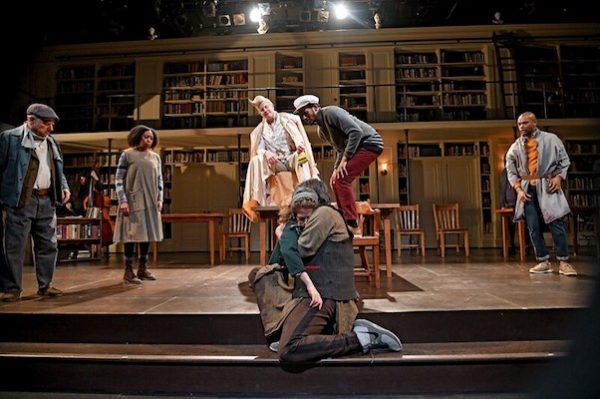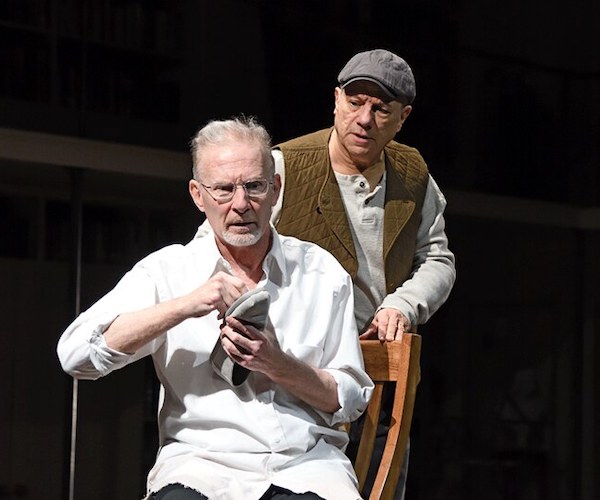Theater Review: “A Tale of Two Cities” — Beware the Revolution!
By Mary Paula Hunter
Given Dickens’s penny-a-word-driven verbosity and his fondness for resolving every plot point with a flurry of coincidences, adapter McEleney seems undecided: Is this history play a tragedy or a farce?
A Tale of Two Cities by Brian McEleney, based on the novel by Charles Dickens. Directed by Tyler Dobrowsky. Set design by Eugene Lee. Staged by Trinity Repertory Company at the Chace Theater, 201 Washington Street, Providence, RI, through March 22.

Rebecca Gibel and Dave Rabinow, center foreground, as ensemble, and Matt Clevy, center background, as the Marquis and the company in the Trinity Rep production of A Tale of Two Cities. Photo: Mark Turek.
Bernie Sanders’s mission to empower the working class has resonated with voters across the country. As he surges in the polls, Trinity Rep finds itself in a contrary mood, mounting a new stage adaptation of A Tale of Two Cities, Dickens’s cautionary tale about what happens when an angry mob goes on a destructive rampage.
Set for the most part in revolutionary France, this version of the Dickens classic is unwieldy, full of too many entangled plot lines. But the show’s essential message is clear: when the underclass rises up against its oppressors, the result will be ruinous.
That the genteel represent reason and the impoverished mob irrationality is underlined by the play’s setting, not in the streets of Paris (teeming with inequality), but in the bookish gentility of Eugene Lee’s picture-perfect library. When the mob’s anger peaks they go on a book-destroying orgy, trashing the library by ripping apart volume after volume. Civilization in Dickens’s (adapter Brian McEleney’s) view will not be able to withstand the unleashed rage of those at society’s bottom.
McEleney, a longtime Trinity ensemble member, devoted two years to dramatizing the novel, and to his credit, he managed to whittle the sprawling tale into a trim two hours. But the result is a theatrical mixed bag that struggles to find a consistent tone amid bursts of declamation and physical action. Given Dickens’s penny-a-word-driven verbosity and his fondness for resolving every plot point with a flurry of coincidences, McEleney seems undecided: Is this history play a tragedy or a farce?
His extensive use of characters talking about themselves in the third person, describing themselves instead of revealing motive through conflict, adds to the staging’s flat, cartoonish nature.

Brian McEleney as Doctor Manette and Stephen Berenson as Monsieur Defarge in the Trinity Rep production of A Tale of Two Cities. Photo: Mark Turek.
More challenging for McEleney, however, is what to do with the tropes Dickens employs not only about the supposed irrationality of the lower classes, but about the dual nature of women. Full of homicidal revolutionary fervor, Madame Defarge symbolizes the dangerous, vengeful female. She is irrational, near-mad, and soulless. As played by Rachel Warren, Madame Defarge comes off as shrill, screaming her lines for the entirety of the second act. By the end of the show, this Defarge is out of control, practically engineering her own death in a wild fight with a ridiculous governess.
Silly women, as exemplified by the governess, do not threaten societal order. They are merely ornamental or good for a laugh. The governess’s charge, however, the meek and earnest Lucie Manette, represents Dickens’s ideal woman. The daughter of the wrongly imprisoned doctor, Lucie, as played by Rebecca Gibel, is unnervingly calm and sweet throughout the chaos. She is content to marry, take care of her father, and give birth. If Madame Defarge is childless, unmerciful, and furious, Lucie Manette is her obedient opposite — all empathy and caring.
In our post-feminist, #MeToo age, it is difficult to take these representations seriously — Victorian constructions of womanhood — dramatized without any attempt at interrogation. As for A Tale of Two Cities itself, anyone who is not a billionaire will have to ask: Why this story and why now?
Mary Paula Hunter lives in Providence, RI. She’s the 2014 Pell Award Winner for service to the Arts in RI. She is a choreographer and a writer who creates and performs her own text-based movement pieces. In 2019 Hunter published Someone Else, a novel set in her hometown of East Lansing, Michigan.
.

Loved the review. I concurred with this in many similar ways in my own review, published this week in RICentral newspapers and online (the revolution willing). You write exceptionally well. I can email my review, if you’d like. I look forward to more of yours, Ciao, James